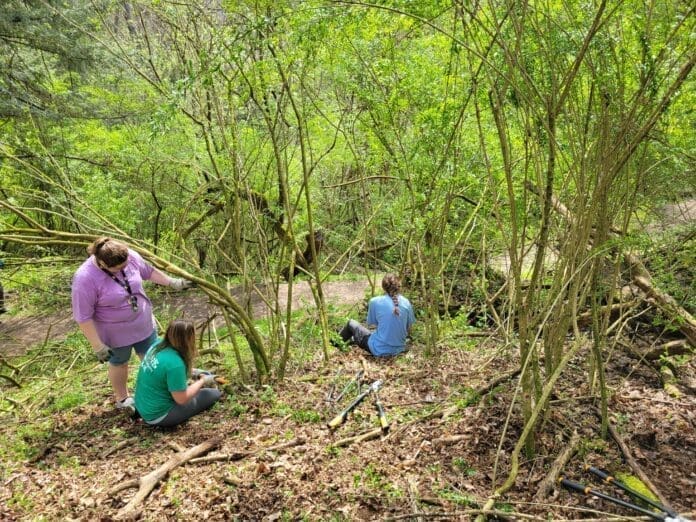Just in time for Earth Day 2023, West Liberty University biology students completed service work that improves the local environment and encourages others.
“Our biology students completed several service projects this semester, working with the U.S. Fish and Wildlife Service, West Virginia University Extension Service and Oglebay Institute’s Schrader Environmental Education Center. I am thrilled to work with these amazing community partners and our outstanding students to help improve the local environment and provide students hands-on learning experiences,” explained Dr. James Wood, an assistant professor of ecology at the university.
In one project with WVU Extension Service, students planted native flowering trees at the Wheeling Creek Greenway, located in the Elm Grove neighborhood of Wheeling. Also known as the “rail trail,” the greenway is used by residents and visitors alike, for biking, walking, running and exercise. It stretches between downtown Wheeling to Elm Grove.
In another project at the U.S. Fish and Wildlife Service’s Ohio Rivers Island National Wildlife Refuge on Buffalo Creek, students planted native plants to help stabilize stream banks, picked up trash and litter, and removed invasive species.
“The student’s efforts help improve habitat quality in the refuge and make it a nicer place for the public and for wildlife” said Dr. Wood. The refuge is open to the public and frequently used for fishing and as a location to launch boats into the creek,” Wood said.
A third project at Schrader Environmental Education Center is part of a long-term restoration and management effort in the park. Students have been clearing invasive exotic plants that have overtaken sections of the forest, pushing out the native plant and preventing young trees from being able to establish.
“Biology students have been working in the area for several semesters and they have transformed the area from a monoculture of invasive privet into a hotspot of biodiversity in the forest. Soon the project will include planting native wildlife flowers to help restore habitat for our native pollinators, like birds, butterflies and bees, which have been declining locally and globally.” Said Wood.
Next up, the biology students will work on WLU’s pollinator garden, located outside Arnett Hall of Natural Sciences as they get it ready for spring.
“The pollinator garden was created to showcase native flowering plants and support pollinator bees and butterflies,” explained Wood.
The Mountain State is known for its streams, mountains, forests and outdoor activities and WLU biology students actively learn as they help in this way. The biology students are enrolled in environmental classes like the Fundamentals of Ecology and Evolution course which requires students to perform two service projects as part of class work.
Wood earned his undergraduate degree in environmental studies and biology, his master’s in plant biology, and his doctoral degree in ecology, prior to joining WLU in 2017.
The biology department at WLU is housed in the College of Sciences and offers students the choice of a Bachelor of Science Degree in Biology with several different majors, or a Bachelor of Arts Degree in Biology to pursue teaching.
Biology majors include Environmental Stewardship and Education, Ecology, Evolution, and Organismal Biology, Zoo Science and many more. Students also have the opportunity to pursue a Bachelor of Science in Human Biology + Master of Science Physician Assistant Studies degree through our 3+2 program. Many undergraduate students gain valuable experience working with faculty on research projects in award-winning labs.


